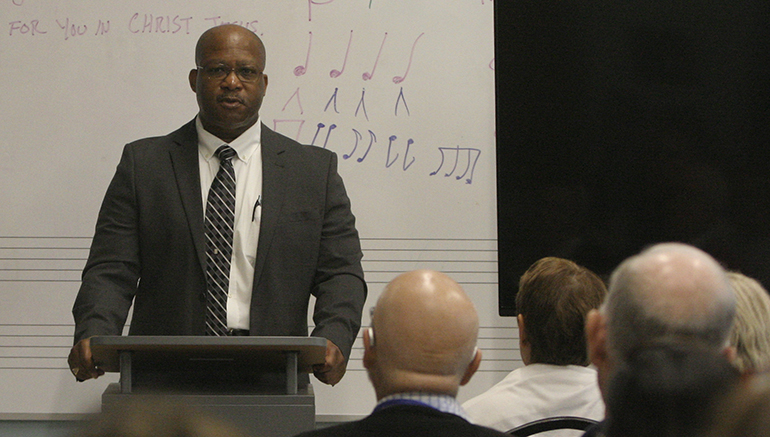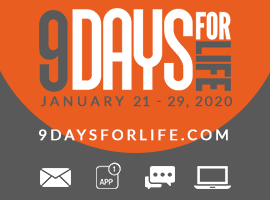By Jean Gonzalez - Florida Catholic - Orlando

Photographer: JEAN GONZALEZ | FC
Ralph “Ron” Wright Jr. shares his story about living on death row and receiving a reversal of conviction to a standing-room-only crowd gathered during the 33rd annual Florida State Respect Life Conference in St. Augustine Oct. 12,2019.
ST. AUGUSTINE| Ralph “Ron” Wright Jr. never thought he would end up on death row.
And it’s a blessing he found his way out of prison at all.
After three years of incarceration in a 6-foot by 9-foot cell, Wright, in 2017, became the 27th inmate to be released from Florida’s death row. Although convicted of first-degree murder of an ex-girlfriend and their 1-and-a-half-year-old child, the conviction was overturned by the Florida Supreme Court, which concluded evidence at trial was “insufficient to sustain Wright’s convictions.”
Wright shared his story with participants of the 33rd annual Florida Respect Life Conference Oct. 11, 2019. Although his presentation was held at the same time as another speaker, it was standing-room-only in the room where he spoke. Deacon Lowell “Corky” Hecht, director of prison ministry for the Diocese of St. Augustine, introduced Wright with the caveat that if someone like him could wrongly be convicted and put on death row, it can happen to anyone.
Wright, who calls Orlando home, was a 22-year, decorated combat veteran of the Air Force who had served in Operations Desert Storm and Desert Shield. At the time of the murders —2007—, he was serving as a patrol deputy for the Orange County Sheriff’s Office. In 2013, he was convicted of crimes he said he never committed. The case against him was “wholly circumstantial,” meaning there was no physical evidence to link him to the crime — no fingerprints, no DNA, no eyewitnesses. Instead, the prosecutors weaved a timeline and hypothesized their version of the events for the jury to believe.
The conclusion of the 2013 trial showed the prosecutors’ story worked. Wright was convicted and sentenced to death. It was the worst-case scenario, and one that he pondered during jury selection for his case. During the voir dire of jurors, one woman said she should be excused from the jury because she had previously served on a murder trial in which the defendant was convicted and sentenced to death. After his execution, the actual killer was uncovered, which meant an innocent person was put to death.
“She said couldn’t have that possibility on her conscience,” Wright recalled the prospective juror stating, which made him scared. “That’s when I thought, ‘This could happen to me.’”
'MANIPULATE THE SYSTEM'
When talking about his case and his conviction in the face of his own innocence, Wright said it is not the U.S. justice system that is flawed, but rather the ethics, procedures and actions of those who “orchestrate and administer” the system who “in far too many ways too often manipulate that system.”
Add to that fact Wright’s belief that society doesn’t possess the “value on life that God created us all to cherish,” and you get innocent people in prison and some awaiting execution.
“In my case there was no evidence of my being complicit, guilty, involved or even having knowledge (of what happened); it was merely about the story the prosecutors wanted to tell the jury,” Wright said. “That case was not about the truth; that case was actually about which side had a better story to tell the jury, so it went their way. It is unbelievable what prosecutors can do in the courtroom.”
Although a deputy for the Sheriff’s Office, Wright had never given much thought to capital punishment and death row before he stared both in the face. During his incarceration, he, like many other prisoners, learned to read case files and rulings and see how it could help them during the appeal processes, either for resentencing or, in Wright’s case, to overturn a wrongful conviction. He recalled a time in the recreational yard where he overheard two inmates talking to a younger inmate about getting on the ball and learning how to help his case legally.
“They said, ‘You don’t want to wait till you’re 25 years in, like we are, to get started on that,’” Wright said. “I stopped in my tracks and said, ‘25 years? Y’all been in here 25 years?’ I could never imagine that happening.”
Wright said his appeals lawyer, who took his case in the post-conviction phase without him knowing, helped save his life, along with his own diligence behind bars. Again, Wright told those gathered there was no concrete evidence to link him to the crime. What’s more, he discovered many of his fellow death row inmates faced those same circumstances. He does not believe he was the only person on death row who was innocent of the crime courts deemed he had committed.
LUCKY ONE
But Wright is one of the lucky ones. When a death row inmate’s appeal is denied, the case is sent to the Florida Supreme Court for a ruling that could either agree or disagree with the lower court ruling. In 2017, the state high court overturned the lower court’s rejection of a new trial, meaning Wright would be released.

While elated about his release, Wright had to start over on the outside because his reputation, despite his innocence, was tarnished. Based on assurances of his guilt from the Pinellas-Pasco State Attorney, which convicted him, the Air Force issued a “Less Than Honorable” discharge and he lost his pension eligibility. That same state attorney blocked any compensation to Wright for his wrongful conviction and incarceration on Death Row because of procedural bars — a tactic used by many prosecutors to avoid considering new evidence germane to the case that might reveal innocence — such as confessions from another person or even DNA or other physical evidence — because it was not presented at the original trial.
Despite all the injustice, Wright works to create an awareness about the death penalty: How it works truly works and how its flaws are a bad mark on American society and on innocent lives. How it is expensive. How it is contrary to Christian beliefs. And how it is not the ultimate punishment, despite what advocates might think.
“I can honestly say after what I went through, I am against the death penalty,” Wright said. “Far too many people look for that closure that is always talked about, but the thing I’ve come to learn is I don’t think that closure exists for anyone. The reason is, and I say this to advocates of the death penalty, the reason is the death penalty’s biggest problem is that it doesn’t do anything but end the penalty. Does food taste better for us after (an execution)? Does the sun shine brighter? Do we sleep better at night? None of that changes for us. But for the executed individual, it’s over.”

